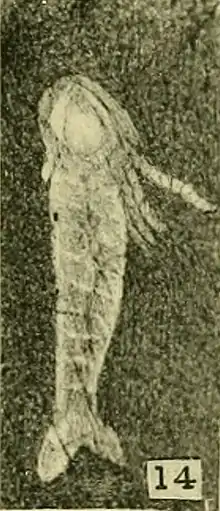Plenocaris
Plenocaris plena is a crustacean-like arthropod with a bivalved carapace, and is known from the Burgess shale[1] and Chengjiang.[2] 106 specimens of Plenocaris are known from the Greater Phyllopod bed, where they comprise 0.20% of the community.[3]
| Plenocaris | |
|---|---|
 | |
| Plate from Walcott, 1912 | |
| Scientific classification | |
| Kingdom: | Animalia |
| Phylum: | Arthropoda |
| Clade: | Crustaceomorpha |
| Order: | †Waptiida |
| Family: | †Waptiidae |
| Genus: | †Plenocaris Whittington 1974 |
| Species: | †P. plena |
| Binomial name | |
| †Plenocaris plena Hou & Bergström 1997 | |
It probably lacked pleopods, but had uropods.[4]
References
- Whittington, Harry B. (1974), "Yohoia Walcott and Plenocaris n. Gen., arthropods from the Burgess Shale, Middle Cambrian, British Columbia", Geological Survey of Canada, Bulletin: 1–21
- Hou, Xian-Guang; Bergström, J. (1997), "Arthropods of the Lower Cambrian Chengjiang fauna, southwest China", Fossils & Strata, Scandinavian University Press, 45: 116
- Caron, Jean-Bernard; Jackson, Donald A. (October 2006). "Taphonomy of the Greater Phyllopod Bed community, Burgess Shale". PALAIOS. 21 (5): 451–65. doi:10.2110/palo.2003.P05-070R. JSTOR 20173022.
- Williamson, D. I.; Rice, A. L. (1996). "Larval Evolution in the Crustacea". Crustaceana. 69 (3): 267–287. doi:10.1163/156854096X00871.
Further reading
Briggs, D.E.G. (1983), Affinities and early evolution of the Crustacea: the evidence of the Cambrian fossils
External links
- "Plenocaris plena". Burgess Shale Fossil Gallery. Virtual Museum of Canada. 2011.
- Image of Plenocaris fossil
This article is issued from Wikipedia. The text is licensed under Creative Commons - Attribution - Sharealike. Additional terms may apply for the media files.